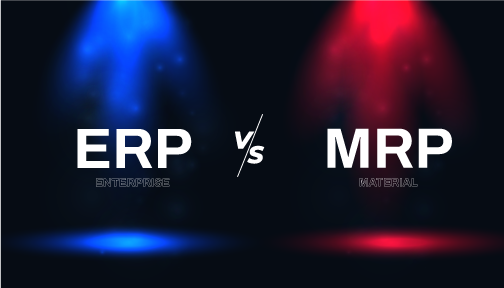When comparing ERP vs MRP, what's the difference? We're explaining what each is and the respective uses in this article.

ERP (Enterprise Resource Planning) and MRP (Material Resource Planning), what are they? They are two related but different software systems used to manage and optimize a company's resources.
Did you know that a recent study conducted by Allied Market Research found that the global ERP market was predicted to reach $86.30 billion by 2027? This is up from the current projected $39.34 billion that it was valued at in 2019. But, again, from 2020 through 2027, this shows a compound annual growth rate of 9.8%.
These systems are made to give a complete picture of how a business works. It helps with finances, inventory, production planning, and customer relationship management.
ERP systems are typically used by larger companies and organizations. MRP systems, on the other hand, focus on the specific needs of manufacturers and other companies that produce physical goods.
When comparing ERP vs MRP, what are the primary distinctions? In this piece, we define these terms and discuss their unique applications.
ERP systems are software solutions that provide an integrated view of a company's operations. These include the following:
ERP systems provide a comprehensive view of a company's financial management operations. The financial management module of an ERP system includes features such as:
These features assist businesses in properly managing their financial transactions.
ERP systems include inventory management as one of their core functionalities. This module helps companies to manage their inventory levels, including:
It allows companies to track inventory levels in real-time and generate reports on inventory usage, cost, and turnover. Companies can also create and manage purchase orders, invoices, and other documents.
ERP systems include production planning as one of their functionalities. This feature helps companies plan and schedule production based on how much stock they have and how much their customers need.
It also lets companies track and watch the progress of production. It also finds any problems or bottlenecks that may come up during the production process. This can help optimize production schedules and increase efficiency.
Customer relationship management is also a functionality included in ERP. This feature lets companies track and manage customer interactions. Customer interactions, such as marketing and sales activities.
It also gives companies access to data and reports in real time. These reports can help them learn more about their customers and ultimately make better decisions. This can help improve customer satisfaction and ultimately increase revenue.
ERP systems are typically used by larger companies. They are intended to support the entire business rather than just a specific department or function.
Because of this, they are ideal for businesses with complicated operations. Businesses need a more thorough way to manage their resources.
MRP systems are software solutions to manage a company's materials and inventory. These modules can include the following:
Production planning is an essential component of MRP systems. This component helps businesses plan and schedule production. It does this according to your customers' needs and how much material you have in stock.
Production planning in MRP allows companies to:
All in all, It allows companies to track and monitor the usage of materials. It also tracks and monitors other resources' use and optimizes their use to control costs.
MRP systems use software to plan and control the flow of materials and parts needed for production. This is called inventory management. This software includes the following:
MRP systems link with production and sales to provide a more complete inventory and production perspective. This can help companies improve productivity, save costs, and improve efficiency by preventing stock shortages and overproduction.
Capacity planning is a core function of MRP systems. This part helps companies plan and schedule production. It does this based on the capacity of its resources, like machines and people.
Capacity planning lets companies figure out how much production they will need in the future. Apart from that, it also looks for possible bottlenecks or limits. This can help improve efficiency and make production schedules better.
MRP systems are typically used by manufacturers and other companies that produce physical goods. They are well suited for companies with complex production processes. Also, businesses that need a more specialized way to track their materials and stock.
While ERP and MRP systems have some similarities, there are also some critical differences.
Typically, ERP systems are more comprehensive and cover a broader range of tasks than MRP systems. MRP systems usually focus more on the needs of companies that manufacture physical goods.
Another critical difference between ERP and MRP systems is the level of integration they provide.
ERP systems integrate a company's operations and data, allowing for a holistic business view. MRP systems, however, focus on areas such as inventory and production management.
In summary, ERP vs MRP systems are both important tools for managing a company's resources, but they have distinct differences.
ERP systems provide a more integrated and comprehensive view of a company's operations. In contrast, MRP systems focus more on the specific needs of manufacturers that produce physical goods.
Today's competitive and fast-paced manufacturing environment requires more than hard labour. Are you a small manufacturing company looking for a way to manage your productivity? Please get in touch with us to start your free 14-day trial!
Statii is a dependable and easy-to-use ERP solution that can help your business boost its efficiency at a low cost. As a result, it will improve your bottom line and allow you to take your company to new heights.